What is netiquette? 21 rules for proper online etiquette
Netiquette is the correct or acceptable way of using the internet and behaving online. Maintaining a positive online presence is just as important as your offline persona, for your benefit and others. Unfortunately, not everyone behaves well online. For better peace of mind, get Norton™ 360 with LifeLock™ Select, which offers powerful protection against scams, fraud, and other online threats.

What is netiquette?
Netiquette refers to the acceptable rules for behaving appropriately online. The word netiquette is a portmanteau of “network” and “etiquette.” It is a set of best-practices and guidelines that promote respect among users and internet safety.
While social etiquette has evolved over time, internet etiquette is fairly new. Netiquette rules and principles have developed to help keep the web a safer and more inviting place. Understanding netiquette guidelines fosters healthier digital interactions and a more positive online environment, which is increasingly important as we spend more time on the web.
Just like we want to put our best foot forward when we’re out in the real world, we should strive to be good citizens in the digital world, which is the very definition of netiquette. People may feel unencumbered and anonymous online, and they may behave worse as a result. But you never know who you’re interacting with, or who might be impacted by what you do, so it’s important to observe proper netiquette guidelines both for your sake and for others.
This article will cover the rules of netiquette and how to conduct yourself online. And we'll also discuss some of the consequences of poor netiquette.
What is the golden rule of netiquette?
The golden rule of netiquette is the same as the golden rule itself: treat others online the way you would like to be treated yourself. When there’s a screen in front of you, you can forget you’re interacting with real people, and you may be tempted to act more abrasively. But don’t fall into that trap. Behaving courteously online, the same way that you would in person, is a good start.
21 Netiquette rules and examples
1. Remember that you’re often talking to another person
When online, don't forget that you’re often communicating with real people, who have real feelings. There’s a human behind the words you’re reading. Online, it’s often too easy to shoot back a negative comment, because you’re looking at text on a screen rather than looking someone in the eye.
When you’re texting or emailing, you can’t pick up on the facial expressions, body language, or tone of voice of those you’re talking to, which can make it easy to misread the context of their words. Meaning can also get lost when auto-correct changes text or speedy typing leaves out critical words.
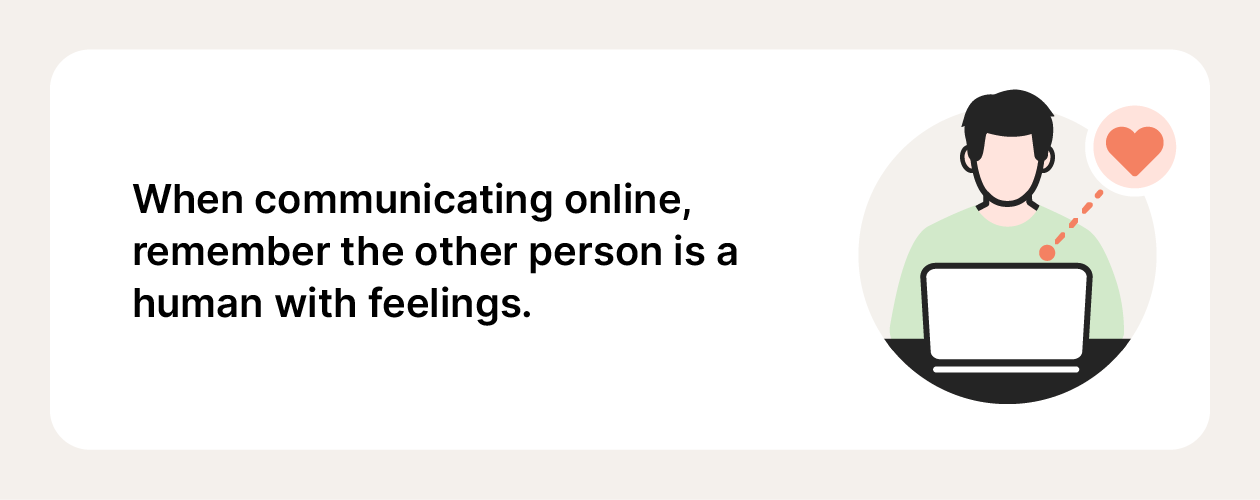
2. Act online how you’d act in real life
There’s something about being anonymous and faceless that ignites a feeling of freedom to say things you would never say in person. While this kind of cyber behavior can feel exhilarating, actions online can have real-world consequences.
Copying someone’s work could violate copyright laws, and lying about someone’s actions could harm their reputation or be considered libelous. On a personal level, you could alienate yourself from friends, family members, or colleagues because of something you’ve written.
Just as in face-to-face interactions, what you say and do online reflects on your character and affects how others perceive you. Whether you share something anonymously or not, always think before acting online and try to maintain the same standards of behavior on the internet as you would in any public or real-world setting.
3. Know your audience
Knowing where you’re writing—and your audience—is essential, because online forums and platforms all have their own rules. What’s acceptable for one group may go against the norms or rules of another.
Communicate in a way that’s appropriate for the specific audience of the platform you’re on. For example, your meat recipe blog subscribers might love your special chicken recipe, but if you post it on a vegan chat group, you’ll likely disgust other members. And the caustic tone you use on the chat group with your friends is likely not appropriate for work communications.
4. Respect other people’s time
In today’s world, with so many devices and media competing for our attention, information overload can often be overwhelming. It’s important to respect people’s time and keep your online communication succinct.
And remember that your communications—whether emails, online chats, photos, or videos—take up storage space. Bombarding mailing lists with large files or unnecessary communications might not just annoy recipients; it might also leave their devices with less space for files they really need.
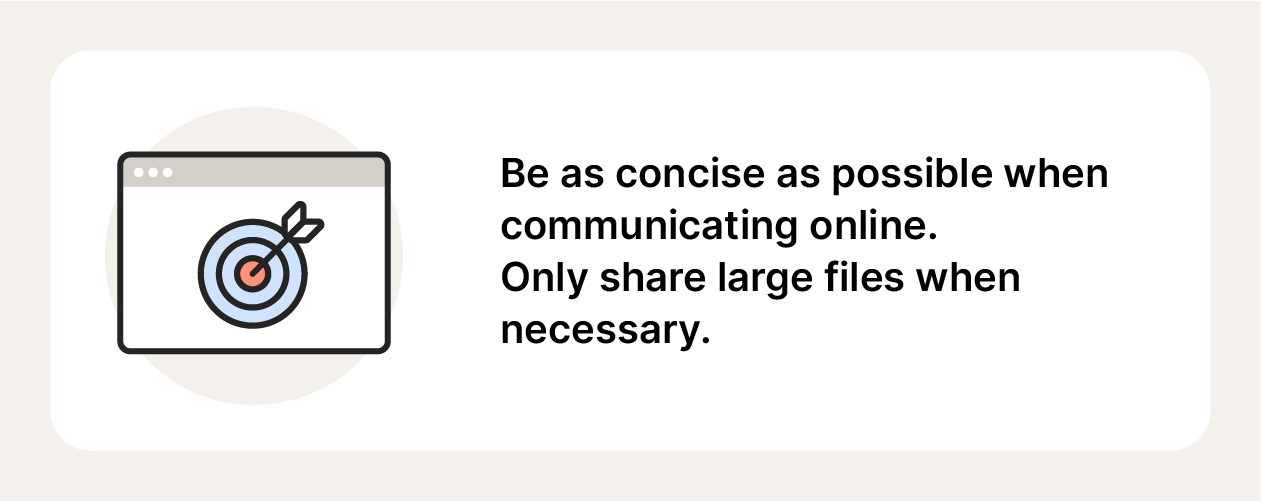
5. Put your best foot forward
Spelling and grammar are meaningful in online communication. And content is key. Before you post about “knowing” something, be sure you really know what you’re talking about.
Another potential drawback of online communication is how easy it is to leave a negative comment if someone ruffles your feathers. Chat rooms can be particularly tempting. Swearing, starting flame wars, or posting comments that you know will cause controversy is just poor netiquette.
6. Share your expertise
One of the benefits of expanded online communication is the ability to find and share expert knowledge quickly. If you’re an expert and have research or news to share, the internet’s a great place to do it. And if you’re a normal user, you can bolster your ideas and claims by finding reputable sources that support you.
But remember that the internet is awash in misinformation, fake news, deep fakes, and other digital flotsam, especially on social media. When sharing online, or sending people links, use trustworthy sources that back up their claims.
7. Stay calm, even when others don’t
Trying to incite drama or capture engagement by expressing strong and obnoxious opinions may be widespread in the cyberworld. In some forums and chat rooms it may be normalized, but it’s not looked upon kindly in others. Administrators of social media groups, for example, may take down these posts or block users from accessing their groups.
To help keep online communications civil:
- Report bad behavior to group or site admins.
- Keep your emotions in check and treat others with respect, even if you disagree with them.
- Don’t pile on; disagreement can turn to bullying if too many people gang up on someone.
8. Respect your privacy and the privacy of others
The ability to share information at the touch of a button comes with responsibility. An important netiquette rule is respecting the privacy of others. Don’t publicly identify or post private information about someone, especially as a form of punishment or revenge, which is a form of doxxing.
You should also avoid snooping around on someone else’s device. Even if it’s left open, this isn’t an invitation to sneak a peek.
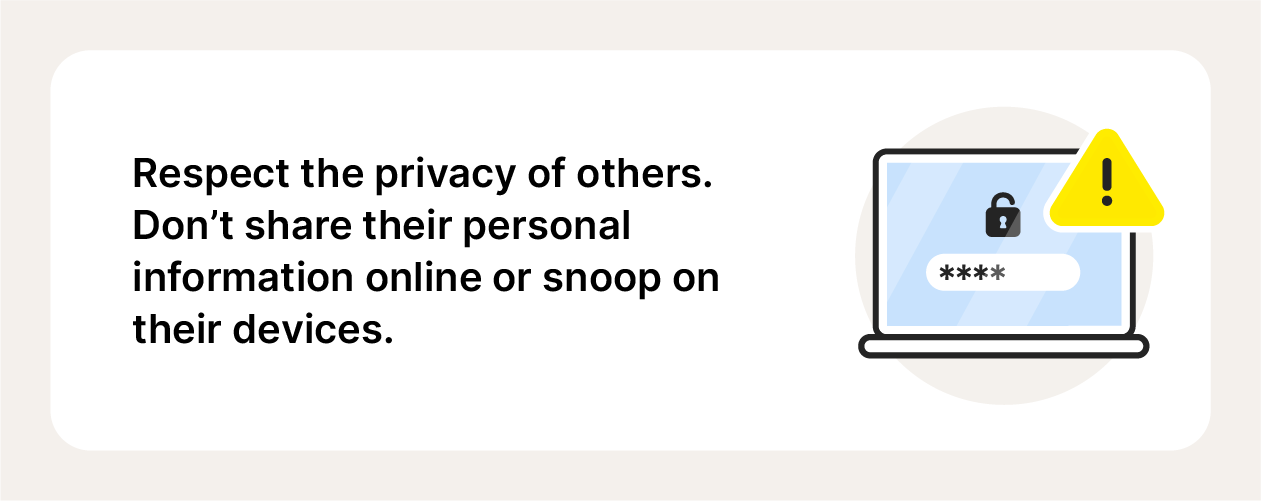
9. Don’t abuse your power
Some people in cyberspace, such as system administrators, have more power than others. But there are certain lines, such as accessing others’ private information, that shouldn’t be crossed.
People in powerful positions may try to gain an edge over their adversaries or put others down on social media platforms simply because they can, or because they have a huge group of followers they’re trying to engage or impress. Don't abuse power or say things online you may someday regret.
10. Forgive people when they make mistakes
When visiting forums or reading articles, remember that individual writers, like anyone else, sometimes make mistakes. While some mistakes are more costly or scandalous than others, extending forgiveness is an important rule of thumb.
We should all take care to confirm that what we’re posting is accurate, especially if it could hurt someone’s reputation. If someone says something hurtful about you without the intention of flaming, you should try to acknowledge their mistake in a forgiving manner.
11. Do your research before speaking out
Spreading misinformation can have wide-ranging consequences, from ruining reputations to undermining commonly accepted norms. Do your research before entering a discussion online or sharing information you find.
Follow these basic principles when conducting research online:
- Ask experts or people you trust for suggestions on where to find reliable information on a particular topic.
- Look for reputable sources that fact-check their claims. Transparent government websites, trustworthy journalistic outlets, and peer-reviewed academic sources are good places to start.
12. Report hate speech
Good netiquette doesn’t stop at your own behavior. In addition to never spreading hate speech yourself, you should report it whenever you see it.
Hate speech is defined as abusive or threatening language that shows prejudice toward others based on their ethnicity, sexual orientation, religion, or similar qualities. You can report hate speech to group admins or the owner of the website you’re on. If you think it rises to a crime, you can report hate speech to the FBI or other government agency.
13. Don’t share personal information
Netiquette guidelines are also intended to keep you safe. A key rule of netiquette is to protect your personal information online and never share too much with others. Revealing more information than necessary, such as where you went to school or your first pet’s name, could put your privacy at risk.
If you share too much personal information with others, it can be used against you to:
- Steal your identity
- Access your online accounts
- Dox, stalk, or swat you
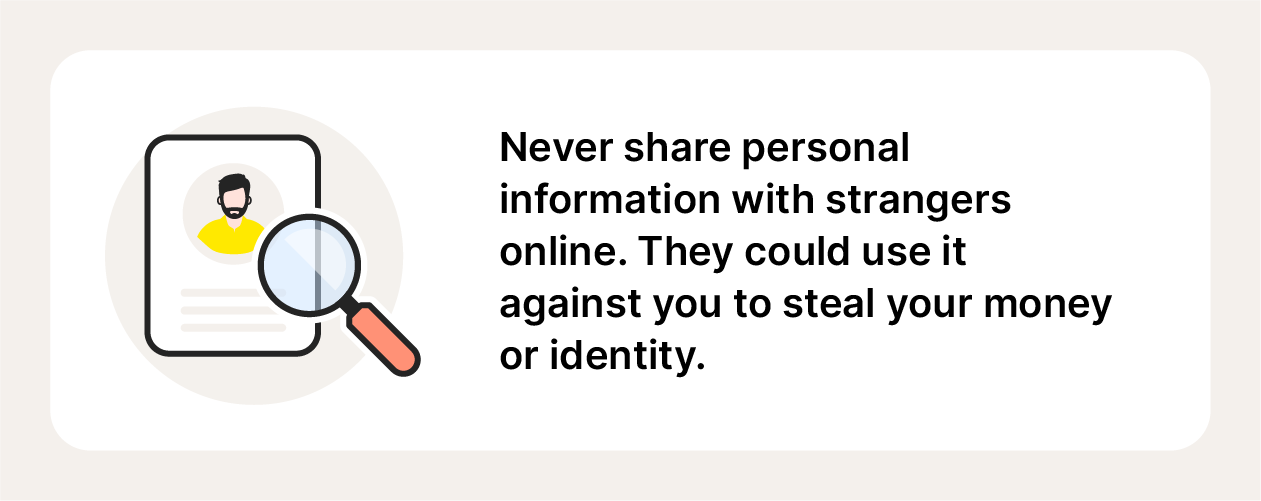
14. Try not to exclude other people
Online communication isn’t always so different from face-to-face interactions. Groups and forums can be cliquey and make it hard for newcomers to speak up. To be more inclusive of others online:
- Ask less active group members for their opinions.
- Create opportunities for new people to introduce themselves.
15. Choose a neutral nickname
When communicating with others under an alias, like in online gaming or forums, pick a nickname that doesn’t give away personal information about you. Avoid your real name, birthdate, or any other personal details when interacting with strangers. You should also select a nickname that avoids offensive language or curse words.
16. Don’t record others
You expect your online experience to be safe and private, and netiquette rules require you to extend that same courtesy to others. As such, you should never record anyone, for example on a livestream or video chat, without their consent.
17. Ask for clarification instead of making assumptions
It’s much easier to misunderstand someone’s point online when you don’t have tone of voice or body language to help you out, and predictive text or typos can creep in and distort meaning further. Instead of making an assumption, ask for clarification, just like you would in real life.
18. Don’t be a spammer
Spamming is flooding people with excessive amounts of unwanted information. This could include spamming people with emails when they sign up for a mailing list, blowing up a thread with way too many replies, or inadvertently forwarding phishing emails or other scams.
Keep your online communications concise and purposeful, and don’t inundate people with unwanted communications. If you’re the victim of spam texts, block the user and report them to the group or site admin. And if you think you’ve come across an online scam, use a scam-detection tool to verify.
19. Know how and when to respond
Netiquette guidelines extend to how and when to respond to others. Here are a few tips:
- Respond promptly, especially to important inquiries or messages.
- Keep your responses succinct and pay attention to spelling and grammar.
- Emojis can be helpful and fun in casual settings but avoid overusing them.
20. Stay on topic
Groups, threads, and discussions can often get heated or derailed. Try to stay on topic and gently remind others to do the same.
Here are a few tips to help discussions remain on track:
- Re-read what you’ve written before sharing.
- If you see a post that is off-topic or a discussion going off the rails, politely remind people of the original topic.
- If things go too far, report the issue to an admin.
21. Know whom to trust and not trust
Trusting people blindly can be dangerous. Online predators can lurk online. Even if you’ve been chatting with someone for weeks or months, if you’ve only interacted online, you don’t know who they really are.
Beware of these warning signs of untrustworthy people online:
- They want too many personal details but share none of their own.
- Their story is inconsistent or you catch them contradicting themselves.
- They have a suspicious-looking social media profile with few or no photos or friends.
- Something just feels off.
Consequences of poor netiquette
The ability to reach out to real people with the simple click of a button can be positive. But this ease of communication—and ability to speak behind the cloak of digital anonymity—can have several consequences:
- Cyberbullying and other toxic behavior: Poor online etiquette can lead to toxic social media exchanges and cyberbullying. This can impact mental health and have legal ramifications.
- Regrettable digital footprints: Children who aren’t taught to safely use social media may be haunted by their digital footprint as they grow up. Once your words or photos are online, you may not be able to take them down.
- Retaliation: Acting out online can have consequences, in the real world and the digital world. You might not be as anonymous as you think, so consider how your behavior affects other people.
- Fraud and scams: If a cybercriminal gets enough personal information about you, they can use this to defraud you or more easily target you with spear phishing or other attacks.
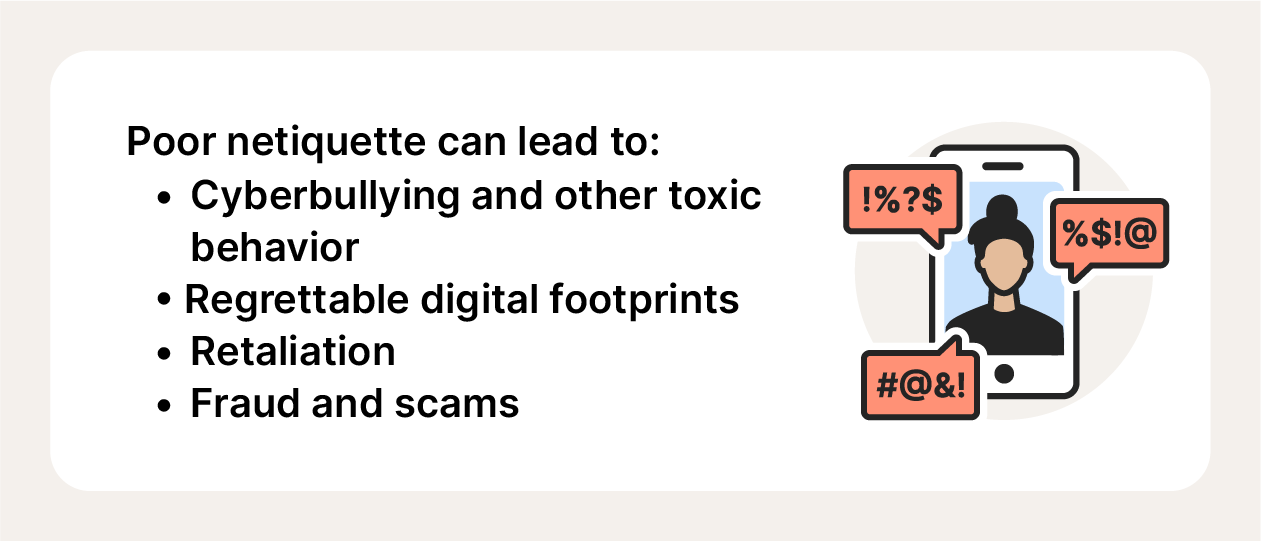
Tips to teach kids proper netiquette
The internet brings many benefits, but it can be a dangerous place. Teaching children proper netiquette helps to protect them online and off.
Here are some tips to keep your kids safe online:
- Apply real-world principles: Set the same expectations for behavior online as you would for home, school, or a public setting.
- Be a role model: Make sure you model good behavior online so that your kids can follow your example.
- Set clear boundaries: Talk to your children about what they are and aren’t allowed to do online. Consider setting parental controls to help keep them within those boundaries.
- Actions have consequences: Your child needs to be aware that what they share now might be visible to future employers, colleges, and others. Digital debris can be permanent.
- Safety matters: Scammers and criminals lurk online, ready to exploit the vulnerable. Talk to your child about how to identify suspicious people, websites, and links. Making sure they know how to protect their personal information can go a long way to helping avoid child identity theft.
Protect your digital life
It’s not easy to navigate the complexities of online communication. Understanding the norms and proper etiquette of all the different places we visit on the web is challenging. And knowing what to engage with and what might be a scam isn’t always obvious. That’s where comprehensive online security comes in.
Norton 360 with LifeLock Select will strengthen your online privacy with a built-in VPN and help protect against malware, scams, and other online threats. Plus, it monitors for misuse or abuse of your identity so you can live your digital life in peace.
FAQs about netiquette
There are a lot of netiquette rules to wrap your head around. Here are some answers to netiquette FAQs to help break things down.
Is netiquette the same across the internet?
Yes and no. Different groups, forums, and platforms all have different rules and regulations that you will be expected to follow. But the golden rule remains the same across the internet: treat others online the way you would like to be treated yourself.
What is the difference between social norms and etiquette?
Social norms and etiquette are essentially the same thing—a set of behaviors that all members of society or a group, online or offline, are expected to follow.
When should kids learn about netiquette?
If your child is using the internet, they should be aware of how to behave online and how to keep themselves safe when interacting with others. This applies to social media, online gaming, and any other online activity.
What makes a good digital citizen?
A good digital citizen follows netiquette guidelines and treats others the way they want to be treated. They are respectful toward others, don’t spread misinformation, and understand that there are people behind words on the internet.
* We do not monitor all transactions at all businesses.
Editorial note: Our articles provide educational information for you. Our offerings may not cover or protect against every type of crime, fraud, or threat we write about. Our goal is to increase awareness about Cyber Safety. Please review complete Terms during enrollment or setup. Remember that no one can prevent all identity theft or cybercrime, and that LifeLock does not monitor all transactions at all businesses. The Norton and LifeLock brands are part of Gen Digital Inc.






Want more?
Follow us for all the latest news, tips, and updates.